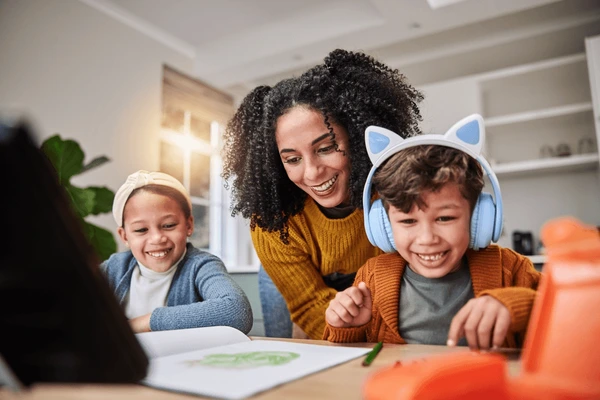Adoption is a deeply nuanced experience, one that can be nearly impossible to fully grasp…
As a therapist and someone who has worked with many families raising kids with ADHD, I’ve seen just how misunderstood this diagnosis can be. When most people think of ADHD, they imagine high energy or trouble focusing. But ADHD is much more complex than that—it can affect how a child regulates emotions, handles transitions, manages time, responds to feedback, and interacts with others.
One of the lesser-known but deeply impactful aspects of ADHD is something called rejection sensitivity, or rejection sensitivity dysphoria (RSD). This refers to an intense emotional reaction to feeling criticized, left out, or rejected—whether that rejection is real or simply perceived.
If I could rename RSD, I’d include the words criticism and feedback in there, too, because they often go hand-in-hand. Many kids with ADHD are incredibly sensitive to criticism, and their reactions can feel confusing or “too big” to parents. But those reactions make sense when we understand what’s going on beneath the surface.
What Rejection Sensitivity Looks Like in Kids with ADHD
Here are some common ways rejection sensitivity might show up in kids:
- Big reactions to small feedback: Your child bursts into tears or storms off after you say something like, “Can you clean your room?” They might hear it as “You’re messy” or “You’re bad,” rather than a neutral request.
- Fear of trying new things: A child might avoid sports, art, or school projects because they’re afraid of being embarrassed or “failing.” The fear of rejection can outweigh their desire to participate.
- Trouble with friendships: Kids may take small social hiccups—like not being picked first for a team or a friend sitting with someone else at lunch—as personal rejection, leading them to withdraw or lash out.
- Over-apologizing or people-pleasing: Some kids try hard to “earn” acceptance, constantly seeking reassurance or becoming overly accommodating to avoid conflict.
- Anger or defensiveness: Other kids might respond to perceived rejection with outbursts or arguments. Anger can sometimes be a cover for hurt or shame.
Why This Happens
ADHD impacts the brain’s executive functioning, which includes emotional regulation and impulse control. Kids with ADHD often feel emotions more intensely and take longer to calm down after they’re upset.
Over time, repeated experiences of being corrected (“Sit still,” “Focus,” “Why can’t you remember?”) can build up a sense of I’m always doing something wrong. That makes them especially sensitive to anything that even feels like criticism.
How Parents Can Help
Supporting a child with rejection sensitivity isn’t about removing all criticism—it’s about how we communicate and help them build resilience. Here are a few strategies that can make a big difference:
1. Lead with connection before correction.
- Start with empathy before giving feedback.
- “I know you really wanted that drawing to be perfect—it’s frustrating when it doesn’t turn out the way you hoped. Let’s figure out what might help next time.”
- This helps your child feel seen and safe before hearing what needs improvement.
- “I know you really wanted that drawing to be perfect—it’s frustrating when it doesn’t turn out the way you hoped. Let’s figure out what might help next time.”
2. Use gentle language.
- Swap “You’re not listening” for “Hey, can I get your attention for a second?” or “Let’s try again together.” Tone and phrasing matter—it helps reduce defensiveness.
3. Help them name feelings.
- Labeling emotions builds emotional awareness and control.
- “It seems like that comment hurt your feelings. That makes sense—it can sting to hear feedback.”
- Once the emotion is named, it’s easier to manage.
- “It seems like that comment hurt your feelings. That makes sense—it can sting to hear feedback.”
4. Encourage effort, not perfection.
- Kids with ADHD often feel like they can’t get things “right.” Celebrate small wins and persistence:
- “I saw how you stuck with that homework even when it was hard. That shows real effort.”
- This reinforces growth over outcome.
- “I saw how you stuck with that homework even when it was hard. That shows real effort.”
5. Model healthy self-talk.
- Kids learn from what they see. Let them hear you reframe mistakes kindly:
- “Oops, I forgot to send that email. That’s okay—mistakes happen. I’ll set a reminder next time.”
- This normalizes imperfection.
- “Oops, I forgot to send that email. That’s okay—mistakes happen. I’ll set a reminder next time.”
6. Use “cooling-off” breaks.
- When emotions run high, suggest a pause:
- “Let’s take a few deep breaths before we talk about it.”
- Teach them that taking space doesn’t mean rejection—it means regulation.
- “Let’s take a few deep breaths before we talk about it.”
7. Create a predictable, supportive environment.
- Structure helps kids with ADHD feel secure. Knowing what to expect reduces anxiety about getting things wrong.
- This includes not only creating and following routines, but also being consistent with communication and consequences. (Yes, consequences are a good thing! They don’t have to be negative—they simply teach kids that every choice in life has an outcome.)
When to Seek Professional Support
If your child’s sensitivity to rejection is causing significant distress—like school avoidance, explosive anger, or low self-esteem—working with a therapist who understands ADHD can help. Therapy can teach emotional regulation tools, build confidence, and help parents learn communication strategies that strengthen connection rather than conflict.
The Takeaway
Rejection sensitivity is one of the most emotionally challenging parts of ADHD, but it’s also one of the most manageable when understood. With empathy, patience, and the right tools, you can help your child feel safer, more confident, and more resilient in the face of life’s inevitable ups and downs.
I’m hosting a therapy group starting in 2026 for parents of kids with ADHD. In this group, you’ll learn to recognize patterns in your child’s behavior, better understand how ADHD shows up, and discover practical ways to support your child while also setting healthy boundaries and caring for yourself.
You’ll also connect with other parents who truly get it—sharing experiences, building community, and gaining tools to strengthen your family and support your child’s growth.
Interested? Please complete this brief interest form (it’s not a commitment—just a way to stay informed!).
If you’d like more support navigating ADHD and emotional sensitivity in your family, I’d love to help.
📞 (805) 617-0967
📧 Shannon@RivieraTherapy.com





